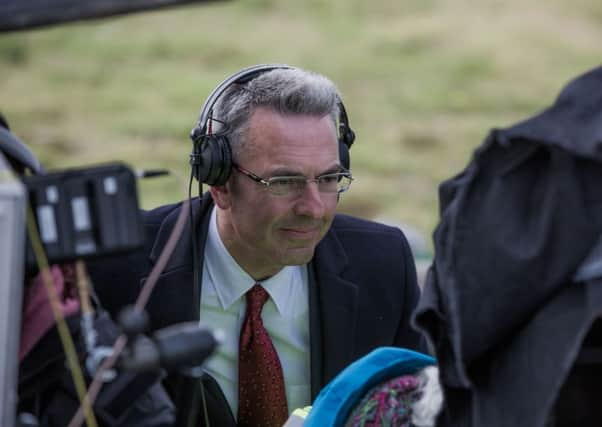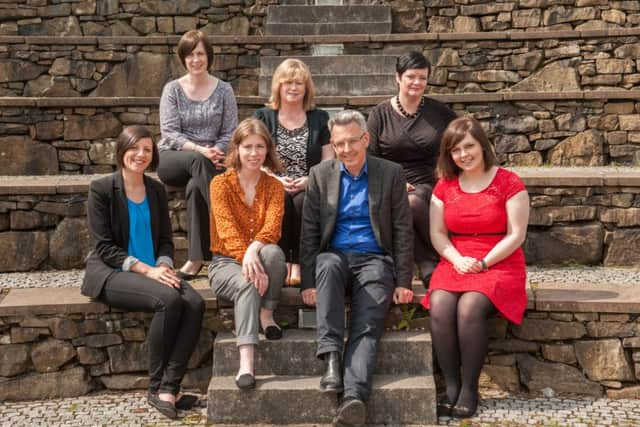Chris Young on new Gaelic drama Bannan


When TV and film producer Chris Young goes to work, he steps out of the cosy home he shares with his wife, the artist Julie Brook, and their children, and heads past the Sound of Sleat and majestic views of the Knoydart wilderness. Young Films is just down the road at Fas, a hub for creative and cultural industries at the Gaelic college Sabhal Mor Ostaig, with a shiny studio and broadcast-standard digital technology.
It sounds like the best of both worlds, but Young admits that his other commutes are more daunting. He takes business meetings in London, flies to Portugal to check on his European co-production, The Invisible Life, visits Paris to talk to Studio Canal executives, and Los Angeles to pitch movies. Yet rather than contemplate leaving Skye, Young Films took the decision two years ago to make the island not just a base, but its headquarters.
Advertisement
Hide Ad“When we first moved here 15 years ago, everybody in the business thought I was off my head,” says Young, now 53. “A lot of people said, ‘you’ll never make it work outside of London’.” He understands some of the scepticism – making drama in Scotland is hard even on the mainland – but Young has been making film and TV features for 25 years. A native of Edinburgh, he’s made movies with the likes of Bill Forsyth and Book Club creator Annie Griffin but has always been especially fascinated by life beyond the Central Belt.


One of his earliest productions was Venus Peter, shot on the Orkney Islands, and screened at the 1989 Cannes Film Festival, and in 2006 his film Seachd, the first-ever Gaelic language feature film, about two young boys who find consolation in their grandfather’s stories, was at the centre of controversy after Bafta refused to put it forward for an Academy Award.
Despite his track record, however, his address still causes some executives to take a sharp intake of breath. “If it says on the letterhead ‘Young Films, Isle of Skye’, you encounter a prejudice about that,” he says.
“I’ve had people mark the company down as a ‘hayseed’ before they’ve met me. I don’t mind that, because you upend the expectation pretty quickly, and very occasionally it has a plus. If you walk into Universal or Studio Canal in Paris, there’s a sense in which you’re not just another film company from London, and you can get a bit of value from that – but there is a risk of being treated like you’re from the Boondocks, there’s no doubt about that. I work in a business where you constantly have to prove people wrong.”
The success of a comedy series he dreamt up in Sleat gave Young the means to stand his ground on Skye. Admittedly, The Inbetweeners had a wobbly start: people were sceptical about a series based around four geeky suburban teenagers chasing girls and cool reputations, and its pilot seemed to struggle to hit its targets. But Young was undeterred, and after recasting the leads and hiring a new director, the E4 series became a hit that surprised even its producer.
The first Inbetweeners Movie became the fastest-grossing live action comedy in UK box-office history, taking £30 million in its first two weeks. There was a premiere on Skye with the cast braving a dip in the Sound of Sleat. However, when the sequel went into production, Young decided to drop out.
Advertisement
Hide Ad“The success of The Inbetweeners meant I had a very successful film company with deep pockets. As a British independent film and TV producer, I’m used to scuttling around trying to raise money and make things work. The Inbetweeners gave me a chance to ask myself what I really wanted to do. And I really wanted to do my work here.”
Young Films relocated to Skye in 2012, and Highlands and Islands Enterprise provided a £106,000 grant to create five new jobs with the company for young locals. Young remains in touch with The Inbetweeners, and kept tabs on the second movie, but instead of shooting pratfalls on location in Australia, Young Films is shooting in peaty locations around Skye.
Advertisement
Hide AdBannan is a Gaelic drama which airs on BBC Alba next month. It’s a big step for Young Films and Alba. Drama is expensive genre, and the channel hasn’t done much since it launched, just a few one-offs and a repeat of STV’s 1990s soap Machair.
Football is currently the big ratings winner on Alba, and the channel’s detractors claim it is in the schedule to boost audience figures. Could Young’s Gaelic domestic drama deliver a bona fide hit to the station? “It’s not going to hit the numbers of something like The Inbetweeners movie, but I’m hoping that Bannan will appeal not just to Gaelic speakers,” says Young.
The title approximately translates as “ties that bind” and leads off with the return of a young woman to the island home she escaped when she was 18. The other key character so far is an 80-year-old woman – deliberate choices, aimed at drawing female audiences to the channel.
Scripted by Chrisella Ross and directed by River City actor Tony Keaney, Bannan not only sidesteps the traditional gritty masculine storytelling favoured by the Central Belt, but aims to avoid heather-and-mist idolatry. “We tend to portray rural life in Scotland as a bit idyllic and pastoral, so I was quite keen to do something about a rural situation that wasn’t Monarch of the Glen,” says Young. “We want to be contemporary, and there’s quite a bit of humour in it, because I can’t resist that,” says Young.
The first parcel of episodes was shot out of season, when local hotels could accommodate cast and crew. This put them at the mercy of autumn and winter weather on Skye.
“We had to be flexible,” admits Young. “It helped to be in a position where we could say, ‘let’s leave that bit of shooting till next week’, so there’s a bit of room for manoeuvre.”
Advertisement
Hide AdBigger budget movies cannot be so light on their feet. In February a Macbeth production with Michael Fassbender and Marion Cotillard arrived on Skye to shoot outdoor scenes for a week. “The difference in scale was almost hilarious. And because it was on such a tight schedule, they had to take what they got – which was the most awful lashing weather of the season.”
Bannan’s first episode premiered at this year’s Edinburgh Film Festival, and the hope is it will become a flagship, with up to 20 episodes a year.
Advertisement
Hide AdCreative Scotland has pitched in £300,000 of the budget and MG Alba, which runs BBC Alba in partnership with the BBC, is also helping fund the show, but the costs are still a shoestring compared to most broadcast series. “It’s about half the cost of what is going out on BBC 1,” agrees Young. “but we will be judged as if it is the same.”
Ironically, it could be that Bannan will get a better reception outside Scotland, in countries that do not fear subtitles and could be charmed by a window into daily Hebridean life. In other words, Bannan may yet be our Borgen.
In any case, Young has made his point that life for film and TV production is viable outside London and Glasgow. Besides Bannan and Invisible, he has several other feature films set in Scotland on his slate, including an adaptation of Neil Gunn’s Silver Darlings.
“Since he came up here, I’ve got my eye on Michael Fassbender for Roddy,” laughs Young. “That would be good, wouldn’t it? I bet he couldn’t think of anything nicer than spending more time in the rain, or, even better, on a boat!”
• Bannan made its debut on BBC Alba on 23 September